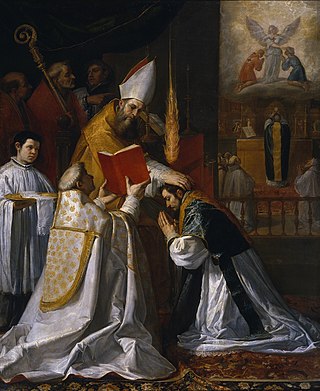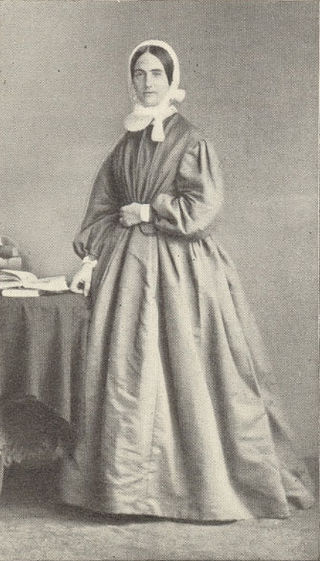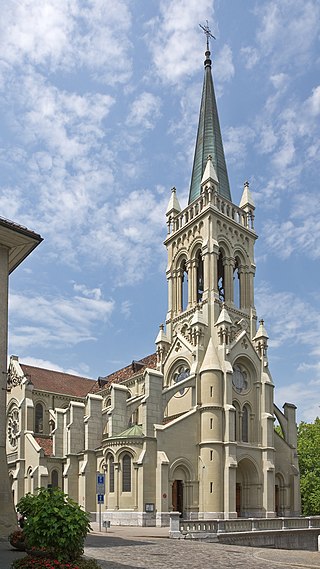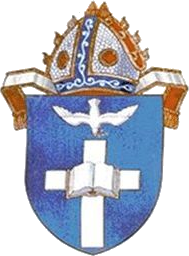
In certain Christian denominations, holy orders are the ordained ministries of bishop, priest (presbyter), and deacon, and the sacrament or rite by which candidates are ordained to those orders. Churches recognizing these orders include the Catholic Church, the Eastern Orthodox, Oriental Orthodox, Anglican, Assyrian, Old Catholic, Independent Catholic and some Lutheran churches. Except for Lutherans and some Anglicans, these churches regard ordination as a sacrament.

A priest is a religious leader authorized to perform the sacred rituals of a religion, especially as a mediatory agent between humans and one or more deities. They also have the authority or power to administer religious rites; in particular, rites of sacrifice to, and propitiation of, a deity or deities. Their office or position is the "priesthood", a term which also may apply to such persons collectively. A priest may have the duty to hear confessions periodically, give marriage counseling, provide prenuptial counseling, give spiritual direction, teach catechism, or visit those confined indoors, such as the sick in hospitals and nursing homes.

A deacon is a member of the diaconate, an office in Christian churches that is generally associated with service of some kind, but which varies among theological and denominational traditions. Major Christian churches, such as the Catholic Church, the Oriental Orthodox Churches, the Eastern Orthodox Church, Lutheranism, Methodism, and Anglicanism view the diaconate as an order of ministry.
A pastor is the leader of a Christian congregation who also gives advice and counsel to people from the community or congregation. In Lutheranism, Catholicism, Eastern Orthodoxy, Oriental Orthodoxy and Anglicanism, pastors are always ordained. In Methodism, pastors may be either licensed or ordained.

The ordination of women to ministerial or priestly office is an increasingly common practice among some contemporary major religious groups. It remains a controversial issue in certain religious groups in which ordination was traditionally reserved for men.

The ministry of a deaconess is a usually non-ordained ministry for women in some Protestant, Oriental Orthodox, and Eastern Orthodox churches to provide pastoral care, especially for other women, and which may carry a limited liturgical role. The word comes from the Greek diakonos (διάκονος), for "deacon", which means a servant or helper and occurs frequently in the Christian New Testament of the Bible. Deaconesses trace their roots from the time of Jesus Christ through to the 13th century in the West. They existed from the early through the middle Byzantine periods in Constantinople and Jerusalem; the office may also have existed in Western European churches. There is evidence to support the idea that the diaconate including women in the Byzantine Church of the early and middle Byzantine periods was recognized as one of the major non-ordained orders of clergy.

The Christian Catholic Church of Switzerland is an Old Catholic denomination in Switzerland. This denomination is part of the Union of Utrecht.

The Anglican Diocese of Armidale is a diocese of the Anglican Church of Australia located in the state of New South Wales. As the Diocese of Grafton and Armidale, it was created by letters patent in 1863. When the Anglican Diocese of Grafton was split off in 1914, the remaining portion was renamed Armidale, retaining its legal continuity and its incumbent bishop.

The priesthood is the office of the ministers of religion, who have been commissioned ("ordained") with the Holy orders of the Catholic Church. Technically, bishops are a priestly order as well; however, in layman's terms priest refers only to presbyters and pastors. The church's doctrine also sometimes refers to all baptised (lay) members as the "common priesthood", which can be confused with the ministerial priesthood of the consecrated clergy.

Aloys Lütolf was a Swiss Catholic ecclesiastical historian.
The ordination of lesbian, gay, bisexual and/or transgender (LGBT) clergy who are open about their sexuality or gender identity; are sexually active if lesbian, gay, or bisexual; or are in committed same-sex relationships is a debated practice within some contemporary Christian denominations.
Angela Veronica Isabel Berners-Wilson is a Church of England priest and chaplain. She is considered to be the first woman to be ordained as a priest in the Church of England. She was chaplain at the University of Bath from 2004 to 2016, and is now rector of a multi-church benefice.

In Christianity, the ordination of women has been taking place in an increasing number of Protestant and Old Catholic churches, starting in the 20th century. Since ancient times, certain churches of the Orthodox tradition, such as the Coptic Orthodox Church, have raised women to the office of deaconess. While ordination of women has been approved in many denominations, it is still a very controversial and divisive topic.
The Ecumenical Catholic Communion (ECC) is an Independent Catholic church based within the United States. Its members understand themselves as following the Catholic tradition without being in communion with the Bishop of Rome. The ECC is a confederation of independent communities based in the United States and Europe. The membership of the ECC is about 10,000, including seven bishops, and more than 50 communities across 20 states. In 2009, the Ecumenical Anglican Church (EAC), an independent church, joined the ECC. The ECC is a member of the National Council of Churches (NCC).
The Philadelphia Eleven are eleven women who were the first women ordained as priests in the Episcopal Church on July 29, 1974, two years before General Convention affirmed and explicitly authorized the ordination of women to the priesthood.
Eggoni Pushpa Lalitha is the Bishop of the Nandyal Diocese of the Church of South India. She is the first woman to become a bishop in Church of South India.
Bärbel Wartenberg-Potter is a German theologian. After serving as director over programs for women and children with the World Council of Churches, teaching theology in Jamaica, and serving a pastorate in Stuttgart, Wartenberg-Potter became the president of the Council of Christian Churches in Germany. In 2001 she began a seven-year term as the third woman serving as a Bishop of a Lutheran Church in Germany.
This is a timeline of notable moments in the history of women's ordination in the world's religious traditions. It is not an exhaustive list of all historic or contemporary ordinations of women.
Coralie Ling is an Australian retired Christian minister. She was the second woman ordained in the Methodist Church of Australasia and the first Methodist woman ordained in the state of Victoria. In 1977, she became a minister in the Uniting Church in Australia when it was formed as a merger of Methodist, Congregationalist and Presbyterian churches.
Ellen Jane Clark-King is a British-Canadian Anglican priest and academic. Since 2020, she has served as Dean of King's College London.










